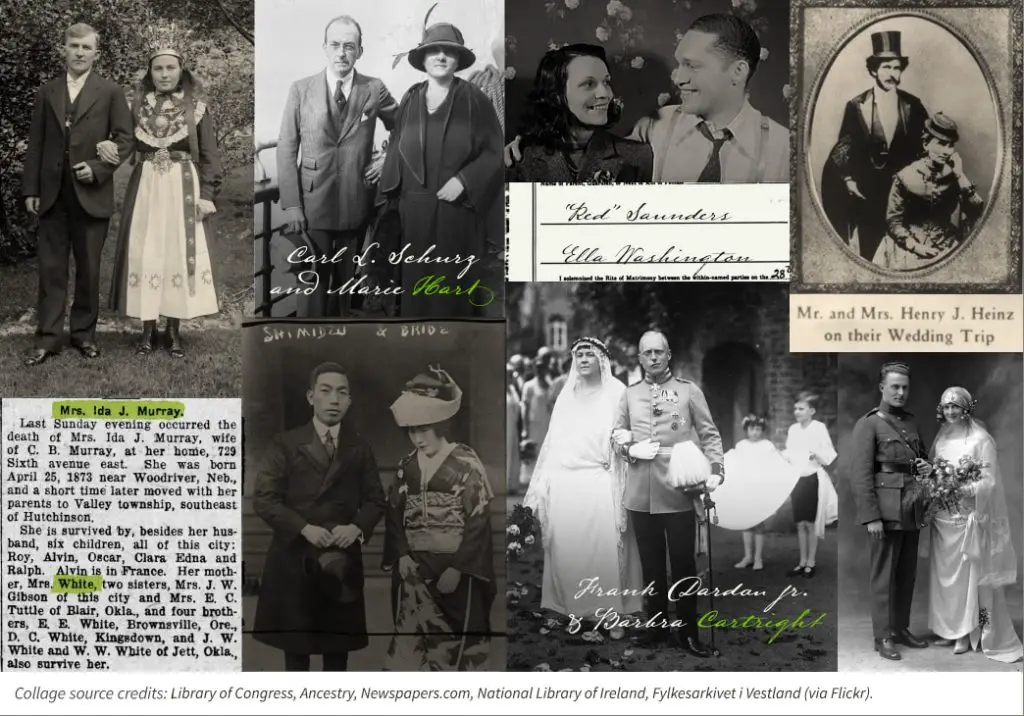No, family name and maiden name are not the same. The family name refers to the last name shared by all the members of a family, while the maiden name is the last name a woman uses before marriage.
Having a clear understanding of the different terms related to names is essential for various reasons, such as legal documentation, family history research, and cultural practices. We will delve into the distinction between family names and maiden names, explaining their definitions and providing examples to help you better comprehend their significance in different contexts.
Whether you are curious about your own family name or interested in learning more about this topic in general, this article will provide the information you need to understand the difference between family name and maiden name.
The Importance Of Family Names In Society
The importance of family names in society cannot be underestimated. Family names hold historical significance, tracing ancestral lineage and providing insights into a person’s heritage. The cultural and societal implications of family names are vast, as they often indicate one’s ethnic or regional background, allowing individuals to connect with their roots. Family naming conventions have evolved over time, influenced by various factors such as migration, intermarriage, and societal changes. As societies become more diverse and interconnected, family names continue to hold relevance, serving as an identifier of personal and familial identity. Understanding the evolution of family naming conventions can shed light on the intricacies of societies and the connections between individuals. Family names not only carry personal significance but also provide a collective glimpse into historical narratives and cultural heritage.
Understanding Maiden Names
A maiden name, also referred to as a birth name or family name, is the surname a person is given at birth and typically retains until marriage. Its purpose is to identify individuals within a family lineage and maintain historical and genealogical records. In many cultures, women traditionally take their husband’s surname upon marriage, replacing their maiden name.
The practice of women changing their surname upon marriage has historical roots. It was primarily influenced by patriarchal societal norms, where a woman’s identity was perceived as being closely tied to her husband and his family. This tradition has evolved over time, and while many still choose to adopt their husband’s name, there is growing acceptance for women to retain their maiden names or use hyphenated surnames.
Maiden names hold social and personal significance. From a social perspective, they help establish connections and genealogical ties among family members. For individuals, maiden names are important in preserving their personal identity, heritage, and professional reputation. Women who choose to keep their maiden names after marriage may do so to maintain continuity in their careers or to honor their family history.
The Debate: Should Family Names Be Maiden Names?
An ongoing debate in society revolves around the question of whether family names should be maiden names. Traditional perspectives often argue for the preservation of family names as a way of perpetuating lineage and heritage. In many cultures, the practice of taking a husband’s surname is seen as a symbol of unity, belonging, and continuation of the family legacy.
On the other hand, modern viewpoints recognize the importance of gender equality and individual choice. Many argue that women should have the right to retain their maiden names as a sign of independence, professional identity, and personal preference. This perspective challenges traditional notions of family unity being centered around a shared name.
Equality and gender considerations also come into play. Some critics argue that the practice of solely adopting the husband’s surname perpetuates patriarchal norms. They advocate for alternatives like hyphenation, blending of surnames, or even creating completely new family names as a way to establish a more equitable and inclusive society.

Credit: www.nytimes.com
Pros And Cons Of Adopting Maiden Names As Family Names
- Maintaining cultural identity: Adopting maiden names as family names allows individuals to retain a connection to their cultural heritage.
- Preserving family lineage: By adopting maiden names, individuals can ensure that their family lineage is passed down to future generations.
- Empowerment and choice: Adopting maiden names provides individuals with the choice to assert their identity and empower themselves.
- Confusion and identity challenges: Changing family names can lead to confusion and identity challenges, especially for future generations.
- Practical considerations: Changing family names can involve legal and administrative complexities, such as updating identification documents and informing various institutions.
- Impact on family dynamics: Adopting maiden names may impact family dynamics, particularly in cases where some family members choose to adopt maiden names while others do not.
Legal And Administrative Considerations
Changing a family name involves several legal considerations that individuals need to be aware of. The process typically requires filing a petition with the appropriate government agency or court, depending on the jurisdiction. This may include providing a valid reason for the name change, such as marriage, divorce, or personal preference.
The procedures for changing a family name vary across jurisdictions, but generally involve filling out a name change application, paying a fee, and providing supporting documentation. This documentation may include a marriage certificate, divorce decree, or court order.
Changing a family name can have implications for various official documents and records. Individuals will need to update identification documents such as their passport, driver’s license, and social security card. They may also need to notify banks, insurance providers, and other institutions of the name change.
The Importance Of Choice And Personal Agency
The choice of a family name is a personal decision with significant implications. It allows individuals to assert their individuality and reflect their identity. By empowering individuals to choose their family names, we recognize and respect their personal agency in shaping their own lives.
This recognition of personal agency extends beyond just naming. It involves overcoming societal expectations and norms that dictate traditional naming practices. This creates space for diverse choices and challenges the notion of a “standard” or “default” family name.
In a world that values individuality and self-expression, it is important to support and validate the decisions people make regarding their family names. Changing societal attitudes toward family name choices can contribute to a more inclusive and empowering environment where individuals can freely define their own identities.
Navigating Cultural And Family Traditions
When it comes to navigating cultural and family traditions, balancing cultural values with personal aspirations can be a delicate process. One aspect of this is the decision about whether to retain or change one’s family name, particularly for women who may have a maiden name. This decision can be influenced by various factors, such as cultural expectations, gender norms, and individual preferences. Communicating one’s naming decisions to family members is crucial, as it allows for open dialogue and understanding. It is important to address potential conflicts and disagreements that may arise from differing viewpoints. Taking the time to listen and empathize with family members’ concerns can help foster respectful conversations and minimize tension. Ultimately, the naming decision is a personal one that should reflect an individual’s values and aspirations.
The Future Of Family Names
New trends and evolving cultural norms have been reshaping the way we perceive and pass on family names. Traditional practices of only using the father’s last name are being challenged by a desire for inclusivity and gender equality. With the rise of feminism and gender-neutral movements, more individuals are opting to hyphenate or combine their last names, merging both their family histories, while others are choosing to create entirely new surnames that reflect their unique identities. Additionally, the increasing recognition of same-sex marriages and partnerships has led to the adoption of various methods to represent both partners’ names. Moreover, multiculturalism and globalization have contributed to the blending of diverse naming customs, resulting in unique combinations that celebrate multiple heritages. Overall, the future of family names is marked by an ever-increasing personalization and a departure from traditional conventions.
| Trend | Description |
|---|---|
| Inclusive Hyphenation | Combining both partners’ last names with a hyphen to signify equality and unity. |
| Name Blending | Creating a new surname that incorporates elements from both partners’ last names. |
| Unique Creations | Choosing entirely new names that reflect personal identities and values. |
| Same-Sex Representation | Developing inclusive methods to acknowledge both partners’ names in same-sex marriages and partnerships. |
| Multicultural Influences | Blending diverse naming customs to incorporate multiple heritages. |
Cultural shifts have played a significant role in transforming family naming practices. The widespread acceptance and recognition of gender equality have challenged traditional patriarchal norms, leading to more individuals seeking alternative options for their family names. Feminism has empowered women to assert their identities and stake equal claims to family heritage. Furthermore, an increasing focus on individualism and personal expression has prompted people to explore non-conventional approaches to naming. Cultural diversity and globalization have also influenced the adoption of hybrid or blended names that celebrate diverse backgrounds. In this dynamic environment, family naming is becoming a meaningful reflection of personal choice, identity, and inclusivity.
As societal attitudes continue to evolve, future naming conventions are likely to become even more flexible and diversified. The trend of inclusive hyphenation and name blending is expected to gain momentum as individuals seek to honor both family histories while forging new identity narratives. We can anticipate a wider acceptance of unique name creations, reflecting the growing importance of self-expression. Recognition of same-sex partnerships will also lead to further innovations in name representation. Additionally, the increasing multiculturalism and globalization will continue to enrich naming practices with a fusion of different cultural traditions. In the coming years, family names will continue to evolve and reflect the dynamic nature of society and the desire for authenticity and inclusivity.
Frequently Asked Questions Of Is Family Name Maiden Name
What Is A Family Name?
A family name, also known as a surname or last name, is a name that indicates the
belongingness of an individual to a particular family or lineage.
What Is A Maiden Name?
A maiden name is a woman’s surname prior to marriage. It is the name she had before
she got married and may be used to trace her genealogical history.
Can I Use My Maiden Name As My Middle Name?
Yes, you can use your maiden name as your middle name. It is a common choice for
women who want to keep a connection to their family name while adopting their spouse’s
surname.
How Do I Change My Name After Marriage?
To change your name after marriage, you will need to update your identification
documents such as your social security card, driver’s license, and passport. You may
also need to inform various institutions and organizations of your new name.
Conclusion
Deciding whether to keep or change your family name as a maiden name is a personal choice that depends on various factors. It’s important to consider cultural customs, family traditions, personal identity, and practical implications. Remember, there is no right or wrong answer, and what matters most is feeling comfortable with your decision.
It’s all about embracing and celebrating your unique journey.








